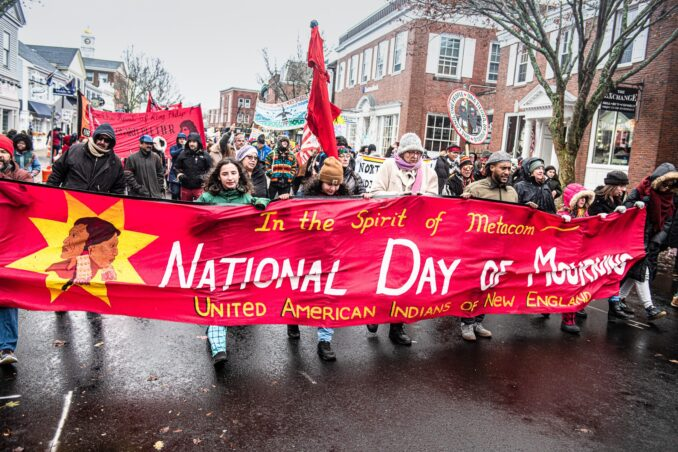Thanksgiving (United States): Difference between revisions
More languages
More actions
m (Literallywho Ingodsname moved page Thanksgiving to Thanksgiving (United States)) |
(Early history) Tag: Visual edit |
||
| Line 1: | Line 1: | ||
[[File:National Day of Mourning protest.png|thumb|Protest against settler colonialism in Plymouth, Massachusetts in November 2019.]] | [[File:National Day of Mourning protest.png|thumb|Protest against settler colonialism in Plymouth, Massachusetts in November 2019.]] | ||
'''Thanksgiving''' is a [[Settler colonialism|settler-colonial]] holiday in the [[United States of America]]. In 1970, Wamsutta Frank James of the Wampanoag nation founded the National Day of Mourning to protest against | '''Thanksgiving''' is a [[Settler colonialism|settler-colonial]] holiday in the [[United States of America]] that occurs on the fourth Thursday in November. In 1970, Wamsutta Frank James of the Wampanoag nation founded the '''National Day of Mourning''' to protest against this celebration of [[colonialism]].<ref>{{Web citation|author=K. James|newspaper=[[Workers World]]|title=53rd National Day of Mourning Indigenous pride, power and protest!|date=2022-11-19|url=https://www.workers.org/2022/11/67789/|archive-url=https://web.archive.org/web/20221120041221/https://www.workers.org/2022/11/67789/|archive-date=2022-11-20|retrieved=2022-11-20}}</ref> | ||
== History == | == History == | ||
Governor [[John Winthrop]] of the Massachusetts Bay Colony proclaimed the first Thanksgiving in 1637 to celebrate a massacre of 700 Pequots in [[State of Connecticut|Connecticut]].<ref>{{Web citation|author=Moonanum James|newspaper=[[Workers World]]|title=In memory of Moonanum James: ‘We are not vanishing. We are not conquered’|date=2022-11-19|url=https://www.workers.org/2022/11/67765/|archive-url=https://web.archive.org/web/20221120041307/https://www.workers.org/2022/11/67765/|archive-date=2022-11-20|retrieved=2022-11-20}}</ref> | |||
=== 1621 pilgrim feast === | |||
When the first [[Kingdom of England (927–1707)|English]] settlers arrived in Massachusetts in 1620, 70% of the local Wampanoag population had already died of smallpox. | |||
The settlers held their famous feast in October 1621 but did not invite any natives as they did in the mythological story. In fact, [[Miles Standish]] had built an 11-foot wall around the settlement days earlier to keep all natives out. However, Chief Massasoit arrived anyway and brought his followers to protect him from being kidnapped.<ref name=":0">{{Web citation|author=Glen Ford|newspaper=[[Black Agenda Report]]|title=The End of American Thanksgivings: A Cause for Universal Rejoicing|date=2023-11-22|url=https://blackagendareport.org/news/1747/33/The-End-of-American-Thanksgivings-A-Cause-for-Universal-Rejoicing|retrieved=2023-11-23}}</ref> | |||
=== 1637 massacre and celebration === | |||
Governor [[John Winthrop]] of the Massachusetts Bay Colony proclaimed the first Thanksgiving in 1637 to celebrate a massacre of 700 Pequots in [[State of Connecticut|Connecticut]].<ref>{{Web citation|author=Moonanum James|newspaper=[[Workers World]]|title=In memory of Moonanum James: ‘We are not vanishing. We are not conquered’|date=2022-11-19|url=https://www.workers.org/2022/11/67765/|archive-url=https://web.archive.org/web/20221120041307/https://www.workers.org/2022/11/67765/|archive-date=2022-11-20|retrieved=2022-11-20}}</ref> [[William Bradford]], who had been Plymouth’s governor for the original 1621 feast, later wrote that, "Those that escaped the fire were slain with the sword; some hewed to pieces, others run through with their rapiers, so that they were quickly dispatched and very few escaped. It was conceived they thus destroyed about 400 at this time." Modern historians believe the death toll was closer to 700.<ref name=":0" /> | |||
=== Later celebrations === | |||
The Pequots had a population of about 8,000 in 1620, which decreased to 1,500 by 1637. In 1676, Massachusetts settlers declared a thanksgiving holiday, saying that, "there now scarce remains a name or family of them [the natives] but are either slain, [[Slavery|captivated]] or fled."<ref name=":0" /> | |||
== References == | == References == | ||
[[Category:Settler colonialism]] | [[Category:Settler colonialism]] | ||
<references /> | |||
[[Category:Holidays]] | |||
[[Category:Racist propaganda]] | |||
Revision as of 21:50, 23 November 2023

Thanksgiving is a settler-colonial holiday in the United States of America that occurs on the fourth Thursday in November. In 1970, Wamsutta Frank James of the Wampanoag nation founded the National Day of Mourning to protest against this celebration of colonialism.[1]
History
1621 pilgrim feast
When the first English settlers arrived in Massachusetts in 1620, 70% of the local Wampanoag population had already died of smallpox.
The settlers held their famous feast in October 1621 but did not invite any natives as they did in the mythological story. In fact, Miles Standish had built an 11-foot wall around the settlement days earlier to keep all natives out. However, Chief Massasoit arrived anyway and brought his followers to protect him from being kidnapped.[2]
1637 massacre and celebration
Governor John Winthrop of the Massachusetts Bay Colony proclaimed the first Thanksgiving in 1637 to celebrate a massacre of 700 Pequots in Connecticut.[3] William Bradford, who had been Plymouth’s governor for the original 1621 feast, later wrote that, "Those that escaped the fire were slain with the sword; some hewed to pieces, others run through with their rapiers, so that they were quickly dispatched and very few escaped. It was conceived they thus destroyed about 400 at this time." Modern historians believe the death toll was closer to 700.[2]
Later celebrations
The Pequots had a population of about 8,000 in 1620, which decreased to 1,500 by 1637. In 1676, Massachusetts settlers declared a thanksgiving holiday, saying that, "there now scarce remains a name or family of them [the natives] but are either slain, captivated or fled."[2]
References
- ↑ K. James (2022-11-19). "53rd National Day of Mourning Indigenous pride, power and protest!" Workers World. Archived from the original on 2022-11-20. Retrieved 2022-11-20.
- ↑ 2.0 2.1 2.2 Glen Ford (2023-11-22). "The End of American Thanksgivings: A Cause for Universal Rejoicing" Black Agenda Report. Retrieved 2023-11-23.
- ↑ Moonanum James (2022-11-19). "In memory of Moonanum James: ‘We are not vanishing. We are not conquered’" Workers World. Archived from the original on 2022-11-20. Retrieved 2022-11-20.
